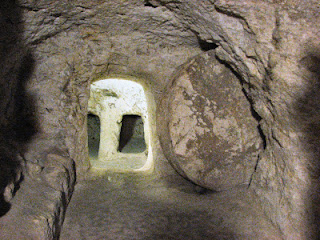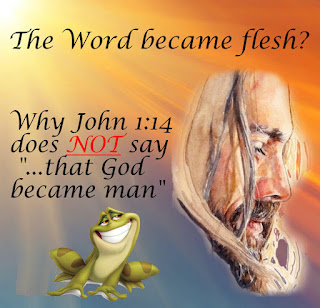The Evolution of the Trinity, Part 1, Interview with Dr. Dale Tuggy
Summary notes for the One God Report podcast, "The Evolution of the Trinity, Part 1", Interview with Dr. Dale Tuggy
First, in AD 100s, we
don’t have any sources for what the average Christian believed. What we do have
are some sources from elite writers who were heavily influenced by Hellenistic,
or Greek philosophy.
These elites made a
strong push for a centralized authoritarian church government led by bishops in
major Roman population centers. Later, these bishops would vote to determine
church policy and doctrine.
Another main feature of
the 100s AD was the emergence of Christian Logos theories. Logos is the Greek
word for “word” in John 1:1.
Logos theories were an
adaption of earlier Greek philosophical speculations, especially of Plato, who
maintained that the ultimate Good or Ultimate Source was too transcendent, too
distinct, too separate from the physical world to either make the world or have
interaction with the world directly. Rather, the physical world was brought
forth by a Craftsman, or Demiurge, itself derived or brought forth by the
ultimate Good or Source.
Hellenized Christians
began to speculate on the pre-human existence of Jesus and adopted this Greek
idea of the “Craftsman”. Jesus was, to
an early church father like Justin Martyr, the “pre-existent” Logos, a derived
second god, a lesser god, a god with a small “g” who was brought forth both to
create and interact with the physical world. Still, the Logos, Jesus, was not
considered to be the One True God, the Father, but was a lesser creation of the
Father.
Not all church fathers
agreed with the Logos theorists, claiming there was no such thing as a second
lesser god. Some Monarchians held that one God worked through the man Jesus.
Toward the end of the 2nd
century and beginning in the 3rd century, that is, the late 100s
into the 200s AD, certain Logos theorists, especially Origin, began to
speculate that the Logos didn’t really have a determined beginning, but as part
of God’s thought or plan was “eternally generated”.
If what Dr. Tuggy says
is correct, there was no such thing as a Trinitarian within at least the first
200 years after Jesus ministered on earth. The pre-existence and “divinity” of
Jesus only started out as a lesser being brought forth by the one true God, an
idea formulated in the backdrop of Greek philosophical speculation. That is,
for centuries after Jesus was on earth, no one believed that the One God eternally
existed in three persons. Rather, the idea of one God in three persons was a
development that took centuries.
In the next episode we
will continue our discussion with Dr. Tuggy, examining the theological
developments in the 200s and into the 300s AD, and we will find out who Dr.
Tuggy thinks were the first Trinitarians.
Dr. Dale Tuggy served as Professor of Philosophy at the State
University of New York at Fredonia for 18 years. His PhD is from Brown
University. He has authored about two dozen peer-reviewed articles and book
chapters relating to the Trinity and other topics in analytic theology and
philosophy of religion; for instance, the Stanford Encyclopedia of
Philosophy article on the Trinity, and his book called What is
the Trinity? Thinking about the Father, Son, and Holy Spirit. Since 2013 he
has hosted “The Trinities” podcast which explores theories about the Father,
Son and Holy Spirit. His podcast and articles can be found on the webpage https://trinities.org



Comments